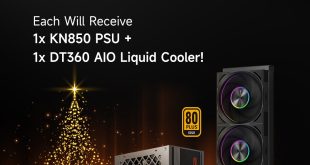AMD are keeping the launch really close to their chest, with partner cards scheduled for a later date. Therefore our sample today has no box, retail packaging or accessories. Also, Crossfire testing will have to follow in a later article.
The HD7970 is built around the classic ‘ATI' (are we allowed to say that?) colour scheme of black and red. The PCB is black.
The HD7970 has received a cooling upgrade, which is long overdue. The fan is wider, with a new blade design which is said to deliver lower noise emissions with enhanced cooling efficiency. Thanks to the wider blades, airflow has also been improved.
The AMD HD7970 is Crossfire capable in 2, 3 and 4 way configurations.
It requires power from a 6 pin and an 8 pin connector.
The card is a dual slot design with a full sized DVI and HDMI port, and two mini Display Port connectors. It is Eyefinity capable and can power up to 6 displays. The HD7970 is the first GPU that can simultaneously output multiple, independent audio streams from the HDMI and mini Displayport connectors at the rear of the card. This is also the first GPU to support 3GHz HDMI with frame packing support for Stereo 3D.
The cooler requires a bit of effort to remove, due to the sheer number of screws holding it in place. AMD are calling this the ‘6th generation vapour chamber' with improved cooling and acoustics capabilities. It follows a similar structure to the previous version with the fan directly forcing air sideways across the copper heatsink and out the back of the case.
The Tahiti core is protected under a partial cover. The memory onboard is high specification Hynix GDDR5. AMD are using a Chil controller, which is a dual loop 6+2 multiphase PWM design. This offers dynamic voltage control and features input voltage management, allowing up to three input voltages to be monitored to ensure adequate power is delivered to suit the load.
The HD7970 is built from 4.3 billion 28nm transistors.
This card features a dual BIOS toggle switch. Setting 1 is the unprotected mode allowing the end user to create their own bios configuration. Setting 2 is the factory default.
The HD7970 Tahiti core operates at 925mhz, and the 3GB of GDDR 5 memory runs at 1375mhz (5.5Gbps effective) which is connected via a 384 bit interface for over 264GB/sec of bandwidth. The card features 2,048 stream processors, is fully PCI E Gen3 compliant (up to 32 gb/s of data bandwidth) and incorporates new AMD Powertune and ZeroCore power technology. There are dual geometry engines, eight render back ends, 32 color ROPs per clock and 128 Z/stencil ROPs per clock.
AMD claim that the new architectural design can deliver up to 4 times the tessellation throughput when compared to the previous generation HD6970.
We did notice during testing with some monitors (including a 50 inch Sharp Aquos 1080p television) that our sample would have a problem holding horizontal sync, with half of the image off the right of the screen. It did work correctly with a Dell 3011U and LaCie 730 monitor however. We only had one sample at hand, so it is impossible to tell yet if this is just limited to our specific early release engineering sample.
 KitGuru KitGuru.net – Tech News | Hardware News | Hardware Reviews | IOS | Mobile | Gaming | Graphics Cards
KitGuru KitGuru.net – Tech News | Hardware News | Hardware Reviews | IOS | Mobile | Gaming | Graphics Cards
















Finally! I’ve been looking forward to AMD giving nvidia a bloody nose!
wow thats a hell of a fast piece of hardware. nice job from AMD
Well after bulldozer they needed to do something, this is it.
but its not a direct replacement for 6970, its a completely new price category, more than GTX580. 6970 was much cheaper.
hey, I wonder how nvidia will respond to this, thats an insanely powerful card. Only concern for me is the price. Ive seen the 6990 on sale for £499.
Very nice, but im more interested in the 7950, and the pricing. this is just too expensive IMO.
Good performance, and nice to see them improving the cooler a little. the HD6990 cooler is insanely loud. I am surprised that it doesn’t cost around £399 inc vat as AMD have always been competitive on pricing. t his seems over the odds IMO.
AMD Radeon HD 7970 a little disappointing. I hope the HD 7970 uses ultra-fast memory such as Rambus XDR2 and able to achieve perfect HQV score of 120. The use of PCI Express 3.0 by the HD 7970 also does not provide significant improvement.